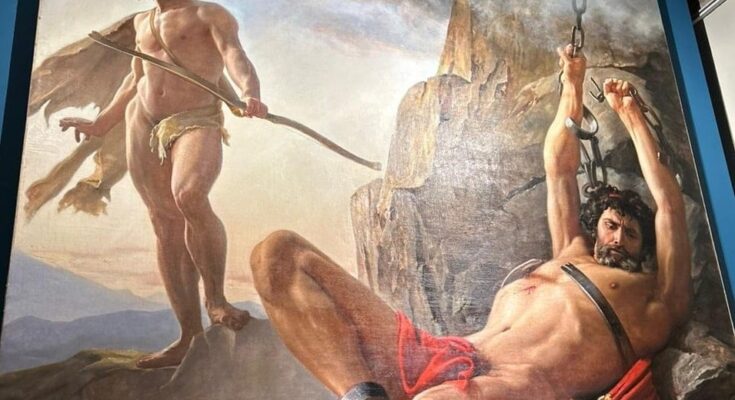
Last exhibited in 1932, Carl Bloch’s monumental painting “Prometheus Unbound” was discovered in Greece recently and is being exhibited in Athens for the first time.
The painting was discovered at the former royal palace of Tatoi in 2022 and after undergoing extensive conservation is now on display at the Pavlos and Alexandra Canellopoulos Museum (CAMU) in Athens.
The painting was temporarily loaned to Denmark in 2023 for a major retrospective at the Statens Museum for Kunst (SMK) in Copenhagen, attracting large crowds eager to see the work, which had been considered lost for many years.
Measuring four by three meters, the painting was commissioned in 1864 by the newly appointed king of Greece Danish-born King George (Georgios I).
Prometheus Unbound and metaphor for Greece
“What makes Carl Bloch’s work even more special, is its historical path,” Lina Mendoni, Greece’s Culture Minister said at the opening of the exhibition in Athens.
“It was commissioned by George I of Greece, a Danish king by descent, who in 1863 assumed the throne of the country. The choice of the myth of Prometheus was not accidental. For the young king, the subject represented his ambitions for the universal liberation and revival of Greece, after the Revolution of 1821.
“At the same time, the work was also of particular importance to Denmark, where it was exhibited in 1865, just one year after its defeat country in the Prussian-Danish war. The Danes saw Prometheus as a symbol of their own national resistance and hope for their liberation, making it a work of dual national significance,” Mendoni added.
The myth of Prometheus
In Greek mythology, the enduring tale of Prometheus unfolds as a symbol of ingenuity, rebellion, and the price of defying the gods. Prometheus, a Titan known for his craftiness and affinity for humanity, chooses to empower mortal beings with the divine gift of fire and knowledge. Despite the wrath of the Olympian gods and their intent to withhold these privileges, Prometheus secretly provided humanity with the means to forge tools, kindle warmth, and explore the realms of wisdom.
For this transgression, Zeus, the king of the gods punished Prometheus harshly. He was chained to a rock while an eagle, an emblem of Zeus’ dominion, perpetually feasted upon his regenerating liver. Each day, Prometheus endured this excruciating torment, only to have his liver grow back overnight, perpetuating his suffering in a seemingly never-ending cycle of agony.
In some versions of Greek mythology, Prometheus is eventually saved by Heracles. As part of his Twelve Labors, Heracles encountered Prometheus and, moved by his plight, slayed the tormenting eagle and freed the Titan from his chains.
Related: Who is Prometheus, the Greek God Referenced in ‘Oppenheimer’?



